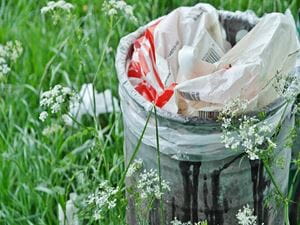
Practicing eco-friendly behavior is ingrained in our biblical history. Earth was a gift to mankind and the Lord fully expected man to execute stewardship. Psalm 24:1 says, “The Earth is the Lord’s and all that is in it, the world, and those who live in it.” The concept of stewardship reflects an ethic that embodies the responsible planning and management of resources. This ideology should be applied to the environment and nature because the Bible repeatedly encourages Christians to take care of Earth. There are several reoccurring themes everyone should acknowledge.
Do not pollute.
“You shall not pollute the land in which you live, for blood pollutes the land, and no atonement can be made for the land for the blood that is shed in it, expect by the blood of the one who shed it.” (Numbers 35:33 ESV)
Have you ever witnessed someone throwing a cigarette butt out of their car window or randomly onto the ground? Or maybe you watched as someone left their trash on the ground? It’s disgusting, right? We all call Earth home; however, some individuals do not flinch when they illegally discard their garbage. People have fought for the freedom that others take for granted. Blood was shed so you can live on Earth yet, so many people take that sacrifice for granted.
It’s imperative that we as a consensus do our part. When we witness pollution, we must pitch in. Pick up the trash and dispose of it correctly. Instead of merely shaking your head, do something!
There is history in nature.
“But ask the beasts, and they will teach you; the birds of the heavens, and they will tell you; or the bushes of the earth, and they will teach you; and the fish of the sea will declare to you. Who among all these does not know that the hand of the LORD has done this? In his hand is the life of every living thing and the breath of all mankind.” (Job 12:7-10 ESV)
Whether you are reading the Bible or reflecting in meditation, there is a common theme of tranquility which is found within nature. Everything plays a role in the story: the fish in the sea, the trees breathing life into the environment, and the creatures providing nutrients to the soil where crops are grown. Oftentimes, mankind takes Earth’s existence for granted – instead of assessing the repercussions of our actions. Global warming, poor air quality, a thinner ozone layer, and extinction of crops and animals are implications of poor decisions. As Job 12:7 says, mankind must take the time to be reflective and listen to nature.
There is no reset button. If we want the resources to last, we must choose to make the appropriate decisions to extend the life of our environment.
The Lord created Earth.
“All things were made through him, and without him was not any thing made that was made.” (John 1:3)
Appreciating the land that we live on means respecting the God who created it. Without the Lord, we would have nothing – no land, no greenery, no animals, no resources. It’s important to remember who is responsible for the Earth’s existence. Mankind can display their appreciation for the Lord’s gift by putting Him first and honoring His masterpiece. The Bible says followers can take care of Earth by listening to the Lord and allowing his Word to be the foundation of our decisions.
It's not ours.
“The land shall not be sold in perpetuity, for the land is mine. For you are strangers and sojourners with me.” (Leviticus 25:23)
The idea that the land is ours is a common misconception that hurts the Earth (and its inhabitants) every day. The keyword, in the above Leviticus passage people, is perpetuity. This term reinforces God’s idea and purpose for Earth. The Lord intended for Earth to be forever flourishing with resources and serve as a permanent sanctuary. However, when the general population tampers with unrestricted territories they forfeit that sacredness. The Bible suggests that the Earth’s inhabitants should remember the land will forever provide, if they remember who provided it, and live respectfully.
The Earth will take care of you, if you take care of the Earth.
“You visit the earth, and water it; you greatly enrich it; the river of God is full of water; you provide their grain, for so you have prepared it. You water its furrows abundantly, settling its ridges, softening it with showers, and blessing its growth. You crown the year with your bounty; your wagon tracks overflow with abundance. The pastures of the wilderness overflow, the hills gird themselves with joy, the meadows clothe themselves with flocks, the valleys deck themselves with grain, they shout and sing together for joy.” (Psalm 65:9-13) ESV
Growing up, you probably heard the phrase do unto others as you would have them do unto you.
God wants His people to have that same mentality and relationship with Earth. If humans continue to pollute the world with their poor environmental decisions the Earth will no longer be able to provide. Think about it, if people continue to dump trash into the ocean, and use poor judgement when discarding waste, the water will no longer be clean to drink – and everything requires water to survive. If we continue to not recycle or develop alternative options, we will not have space to properly discard trash and/or a place to live.The Earth is a sacred place that the Lord created for His children. The Bible provides instructions and reinforced thinking on how inhabitants should live and take care of Earth. The Lord provided a beautiful place to live and the resources necessary to sustain a flourishing life. However, if society continues to abuse the land and resources the Lord’s gift will no longer be able capable of sustaining life.
As a child of God, do your part and pitch in to make a difference. Follow the instructions provided by the Bible. What does this mean? Stop using plastic, dispose of your trash in an eco-friendly way, recycle, assess how you are consuming products, and reinforce your ideals with God’s Word.

